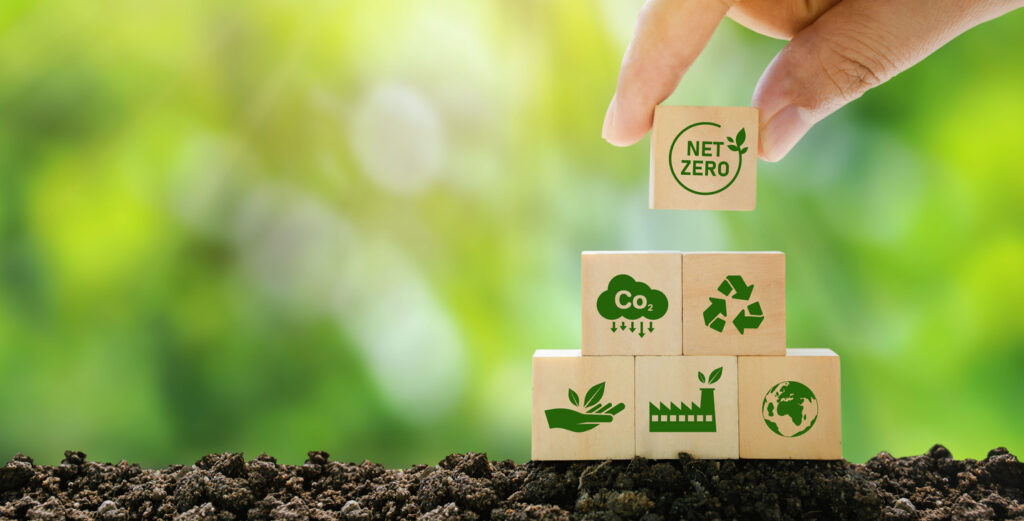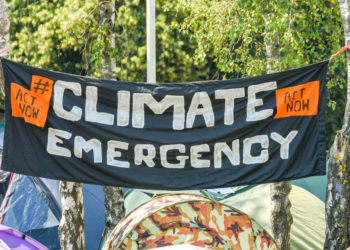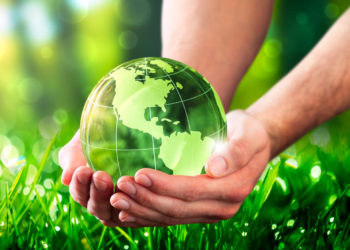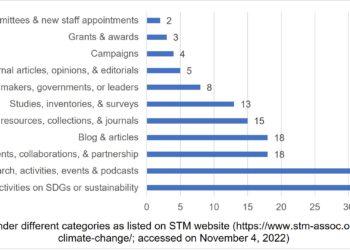Editor’s Note: Today’s post is by Shein Ei Cho, Michelle Fleetwood, Kathleen Kelly Halverson, Sarah L. McCormack, Mark Paglia, and Dianndra Roberts on behalf of ISMTE DEI Advisory Council. Shein is Senior Editorial Research Associate at Public Library of Science (PLOS). Michelle is the Publishing Integrity Manager within the American Chemical Society’s Publication Division. Kathleen is the Editorial Projects Editor for the Serial Publications and Editorial Services Division of the American Speech-Language-Hearing Association (ASHA) Mark is a Journal Manager at the American Institute of Physics (AIP).
Earth Day (22 April) is an annual event to demonstrate support for environmental protection. As members of the ISMTE (International Society for Managing and Technical Editors) Diversity, Equity and Inclusion Advisory Council, we have come together to call on the Scholarly Publishing community.
Like COVID-19 and systemic racism, reducing the worst effects of climate change is something that needs to be addressed at every level of society, including scholarly publishing. The UN Climate Change Conference, COP 26, reinforced an existing narrative that our governments may not have the will or the political power to achieve the carbon emissions targets needed to prevent the worst of the effects of climate change. We as individuals are limited in how much we alone can change. Our businesses and associations must band together and work collectively toward reducing carbon emissions at levels that will provide our children and grandchildren with a livable world. It is not enough to simply publish research on this topic. We must work directly to combat climate change in our operational activities as well.
In September 2021, Laurie Laybourn-Langton and Richard Smith published an Editorial in over 200 journals titled “Call for Emergency Action to Limit Global Temperature Increases, Restore Biodiversity, and Protect Health: Wealthy nations must do much more, much faster”. They write that “Health is already being harmed by global temperature increases and the destruction of the natural world,” and that “Harms disproportionately affect the most vulnerable, including among children, older populations, ethnic minorities, poorer communities, and those with underlying health problems.” The authors follow with the following paragraph:
The consequences of the environmental crisis fall disproportionately on those countries and communities that have contributed least to the problem and are least able to mitigate the harms. Yet no country, no matter how wealthy, can shield itself from these impacts. Allowing the consequences to fall disproportionately on the most vulnerable will breed more conflict, food insecurity, forced displacement, and zoonotic disease — with severe implications for all countries and communities. As with the COVID-19 pandemic, we are globally as strong as our weakest member.
Working to combat the climate crisis fits directly into the missions and goals of the organizations that we in scholarly publishing represent. It can contribute to improved human and animal health, as well as economic and political stability.

In light of the effects that we already see on the most vulnerable among us and those with the fewest resources to respond, the ISMTE DEI Advisory Committee therefore calls on ISMTE and the field of scholarly publishing to set goals and actively work to achieve operational carbon and climate neutrality. Wikipedia defines carbon neutrality as follows:
Carbon neutrality is a state of net-zero carbon dioxide emissions. This can be achieved by balancing emissions of carbon dioxide with its removal (often through carbon offsetting) or by eliminating emissions from society (the transition to the “post-carbon economy”). The term is used in the context of carbon dioxide-releasing processes associated with transportation, energy production, agriculture, and industry. Although the term “carbon neutral” is used, a carbon footprint also includes other greenhouse gases, measured in terms of their carbon dioxide equivalence. The term climate-neutral reflects the broader inclusiveness of other greenhouse gases in climate change, even if CO2 is the most abundant.
Carbon emissions from the knowledge economy in North America and Europe may be small relative to other sectors. This does not make them inconsequential. Rather, this provides the industry with an opportunity to serve as an example of what can be accomplished. In addition, our efforts can demonstrate to governments and other businesses that mitigating the effects of climate change is of paramount importance to their constituents and their customers.
To achieve this, organizations must first and foremost consciously commit to reduce carbon emissions to levels that will keep average global temperature increases below 1.5°C. If our knowledge economy truly supports scientific, evidence-based solutions, all evidence points to reducing carbon emissions as an operational responsibility essential to achieving other organizational goals. This goal must be explicitly included in strategic planning and can be declared publicly on sites such as Publishing Declares, UN Sustainable Development Goals Publishers Compact, and the UN’s Race to Zero.
However, public commitments will not solve our climate crisis. As Matthew Schrag of Vanderbilt University was quoted saying in regards to only one of the many recent crises in scientific reproducibility, “You can’t cheat to cure a disease. Biology doesn’t care.” There must be accountability from the many large organizations that have already committed to many of the goals listed above. Accountability can be achieved by reporting on progress. Report of achievements to our governing boards, our colleagues in the scholarly publishing industry, and the public at large can provide a means of accountability for our public commitments. Most importantly, public reporting of our achievements can provide hope. We need to hear others’ stories not just to inspire competition and new ideas, but also as signals of hope that this crisis is being addressed.
In addition, the many mission-focused organizations whose members publish about both the causes and effects of climate change can and must contribute to the solutions endorsed by their membership and other constituents. Staff time and financial commitments from all organizations are essential to achieving climate-related goals, just as they are essential to achieving diversity, equity, and inclusion goals for which so many organizations voiced support in 2020.
This call is intended to launch a series of case studies about steps that publishers, vendors, and associations are taking to reach carbon neutrality. Elements of case studies can talk about an organization’s motivation and philosophy behind focusing on climate action and carbon neutrality. If an organization has publicly declared any commitment, what strategy or action plan has been developed? What are the salient points of the strategy and resources allocated to implement the plan? Case studies can discuss progress toward their strategy’s implementation, challenges that the organization is facing, how major challenges are being addressed, plan for the next few years, and internal mechanisms to measure the impact/changes they are making.
It is hoped climate neutrality will become part of our discourse on social media and in our business meetings, just as we continue to publish about climate change in our journals. If this problem is going to be solved, it will not be through the work of a single person, organization, or government. It will be through our collective action. Please take this opportunity to share with the community your organization’s work to reduce carbon emissions. You work as an individual, within your organizations, and your participation with your government can help solve the climate crisis and keep our world a safe and habitable place for us and for future generations.
We aim to take action, sharing case studies and experiences to make a change. To get involved please email scholarlykitchen@sspnet.org, signposting climate change case study.
Discussion
2 Thoughts on "Call for Carbon Neutrality in Scholarly Publishing"
Good initiative!
You might know that EASE published an environmental sustainability manifesto in 2021: https://ease.org.uk/publications/ease-statements-resources/environmental-manifesto/
Also, the UN SDG Publishers Compact provides a voluntary initiative, based on a ten-step process, to support the UN sustainable development goals.
Thanks to the authors of this post for calling publishers to share the case studies on their efforts towards achieving net-zero carbon emissions. It can create a fantastic space to learn from each other — how we are addressing a global challenge like climate crisis, what new challenges we are facing while tackling it, and what opportunities for collaboration we have missed so far, which should be harnessed.
Reading this piece, I thought I should share 3 points.
1) In case of climate change, instead of Wikipedia, we should refer to the Nobel-prize winning Intergovernmental Panel on Climate Change (IPCC) for any related definition since it is the authority which has been engaging experts from around the world over the last 35 years. According to the IPCC (https://www.ipcc.ch/sr15/chapter/glossary/), “Net zero carbon dioxide (CO2) emissions are achieved when anthropogenic CO2 emissions are balanced globally by anthropogenic CO2 removals over a specified period. Net zero CO2 emissions are also referred to as carbon neutrality.”
2) The article noted that “Carbon emissions from the knowledge economy in North America and Europe may be small relative to other sectors.” We need to quantify these amounts with latest real numbers. On the one hand, the publishing industry’s current less use of paper indeed reduced carbon emissions compared with 2 decades back, but on the other hand, very high surge of online usage apparently significantly increase energy consumption, much of it still depends of fossil fuels. Any publishers’ association may initiate such an assessment, which others may join in.
3) Over the recent months, several posts attempted to summarise publishers’ climate actions as well their actions towards sustainability, as listed below. We need to build on what we have achieved so far — doesn’t matter if it is limited than the actual needs — through coordinated efforts.
Climate Action: Are We Committed Enough? (Nov 7, 2022)
https://scholarlykitchen.sspnet.org/2022/11/07/climate-action-are-we-committed-enough/
How are Publishing Associations Leading the Way to Meet the SDGs? (Feb 20, 2023)
https://scholarlykitchen.sspnet.org/2023/02/20/how-are-publishing-associations-leading-the-way-to-meet-the-sdgs/
SDG Publishers Compact: Where Do We Stand Now? (Jul 28, 2022)
https://scholarlykitchen.sspnet.org/2022/07/28/sdg-publishers-compact-where-do-we-stand-now/



